Joe Biden banning Russia from U.S. airspace because of Ukraine
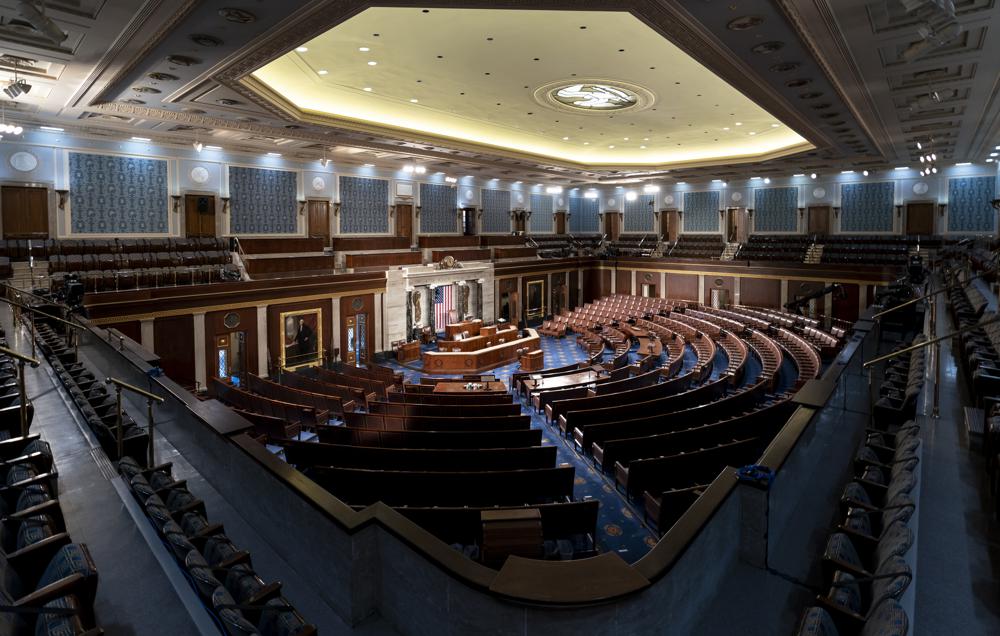
President Joe Biden will vow to make Vladimir Putin “pay a price” for Russia’s invasion of Ukraine in his first State of the Union address, rallying allies abroad while also outlining his plans at home to fight inflation and the fading but still dangerous coronavirus. In addition to recounting U.S. and allied economic sanctions against Russia, Biden planned to announce that the U.S. is following Canada and the European Union in banning Russian planes from its airspace in retaliation for the invasion of Ukraine, according to two people familiar with his remarks’ They spoke only on the condition of anonymity before the speech. Biden planned in his Tuesday night remarks to highlight the bravery of Ukrainian defenders and the resolve of a newly reinvigorated Western alliance that has worked to rearm the Ukrainian military and cripple Russia’s economy through sanctions. He was set to deliver an ominous warning that without consequences, Russian President Putin’s aggression wouldn’t be contained to Ukraine. “Throughout our history, we’ve learned this lesson – when dictators do not pay a price for their aggression, they cause more chaos,” Biden was to say, according to advance excerpts released by the White House. “They keep moving. And, the costs and threats to America and the world keep rising.” Even before the Russian invasion sent energy costs skyrocketing, prices for American families had been rising, and the COVID-19 pandemic continues to hurt families and the country’s economy. Biden planned to outline plans to address inflation by reinvesting in American manufacturing capacity, speeding supply chains, and reducing the burden of childcare and eldercare on workers. “We have a choice,” Biden was to say. “One way to fight inflation is to drive down wages and make Americans poorer. I have a better plan to fight inflation. Lower your costs, not your wages.” Set against disquiet at home and danger abroad, the White House had conceived Tuesday night’s speech as an opportunity to highlight the improving coronavirus outlook, rebrand Biden’s domestic policy priorities, and show a path to lower costs for families grappling with soaring inflation. But it has taken on new significance with last week’s Russian invasion of Ukraine and nuclear saber-rattling by Putin. In an interview with CNN and Reuters, Zelenskyy said he urged Biden to deliver a strong and “useful” message about Russia’s invasion. Ahead of the speech, the White House announced that Ukrainian Ambassador to the U.S. Oksana Markarova would join first lady Jill Biden in the galleries to watch Biden’s address. Biden will address a mask-optional crowd in the House chamber, one sign of the easing coronavirus threat. But he’ll also speak from within a newly fenced Capitol due to renewed security concerns after last year’s insurrection. Rising energy prices as a result of Russia’s war in Ukraine risk exacerbating inflation in the U.S., which is already at the highest level in 40 years, eating into people’s earnings and threatening the economic recovery from the pandemic. And while the geopolitical crisis in Eastern Europe may have helped to cool partisan tensions in Washington, it can’t erase the political and cultural discord that is casting doubt on Biden’s ability to deliver on his pledge to promote national unity. Biden is speaking to an American public that is frustrated with his performance. A February AP-NORC poll found that more people disapproved than approved of how Biden is handling his job, 55% to 44%. That’s down from a 60% favorable rating last July. White House officials acknowledge the mood of the country is “sour,” citing the lingering pandemic and inflation. Biden, in his speech, will highlight progress from a year ago — with the majority of the U.S. population now vaccinated and millions more people at work — but also acknowledge that the job is not yet done, a recognition of American discontent. Biden aides say they believe the national psyche is a “trailing indicator” that will improve with time. But time is running short for the president, who needs to salvage his first-term agenda to revive the political fortunes of his party before November’s midterm elections. House Republicans say the word “crisis” describes the state of the union under Biden and Democrats — from an energy policy that lets Russia sell oil abroad to challenges at home over jobs and immigration. “We’re going to push the president to do the right thing,” said House Majority Leader Kevin McCarthy. At least a half dozen lawmakers, including Reps. Jamie Raskin and Pete Aguilar, both members of the committee investigating last year’s Capitol riot, and Sen. Alex Padilla, D-Calif., had tested positive for COVID-19 and were not expected at the Capitol for the speech. Where his speech to Congress last year saw the rollout of a massive social spending package, Biden plans this year to repackage past proposals in search of achievable measures he hopes can win bipartisan support in a bitterly divided Congress before the elections. The president was to highlight investments in everything from internet broadband access to bridge construction from November’s $1.2 trillion bipartisan infrastructure law as an example of government reaching consensus and delivering change for the nation. He also planned to appeal to lawmakers to compromise on rival competitiveness bills that have passed the House and Senate; both meant to revitalize high-tech American manufacturing and supply chains in the face of growing geopolitical threats from China. The speech comes as progress on many of Biden’s other legislative priorities remains stalled on Capitol Hill after Democratic Sen. Joe Manchin scuttled the sweeping “Build Back Better” spending bill that Biden championed last fall. As part of his pitch to voters, Biden was to resurrect components of the legislation, but with a new emphasis on how proposals like extending the child tax credit and bringing down child care costs could bring relief to families as prices rise. He was also to outline how his climate change proposals would cut costs for lower- and middle-income families and create new jobs. Jen Psaki said Biden “will absolutely use the word inflation” in the speech but emphasized that he was
Congressman Mike Rogers joins colleauges to voice concern over safety of Olympic athletes in China
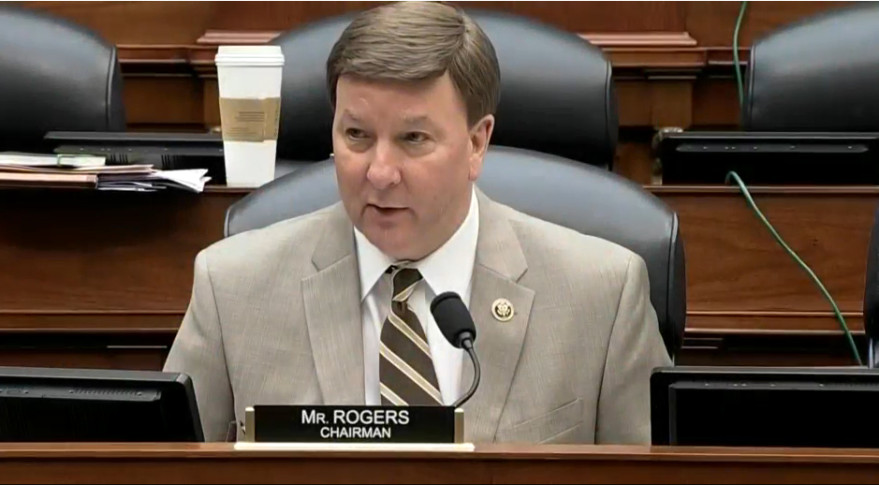
Congressman Mike Rogers joined China Task Force Chairman Michael McCaul and House Republican Leader Kevin McCarthy in sending a letter to Board Chair of the U.S. Olympic & Paralympic Committee (USOPC) Susanne Lyons. The letter expresses concern and the importance of ensuring U.S. Olympians are educated on how to stay safe during the Olympics. Additionally, they commented on the Chinese Communist Party’s (CCP) gross human rights abuses, including genocide. The letter specifically asks that Olympians are informated on how to keep themselves safe. The Beijing Organizing Committee and the CCP has made clear that they will have an unprecedented level of control over the athletes. The letter also asks that the USOPC prepare athletes with the knowledge they need about their rights while in China and also requests an explanation of what steps have been taken to ensure the safety of athletes who may exercise their freedom of speech. “The United States Olympic and Paralympic Committee (USOPC) has a responsibility to ensure our athletes are prepared for these unprecedented Olympic games,” the lawmakers wrote. “Congress legislatively empowered the USOPC with the exclusive privilege of representing the United States in the Olympic community. American values are a core part of the USOPC’s Congressional charter, including a duty to ‘promote a safe environment in sports.’ In recent weeks, Congress has acted to further increase the preparedness and safety of American athletes representing the United States in human rights-violating countries, by codifying the American Values and Security in International Athletics Act.” The Republican-led China Task Force aims to help reinforce Congressional efforts to counter current and emerging cross-jurisdictional threats from China. The letter was also signed by China Task Force Members Reps. Andy Barr (R-KY), Liz Cheney (R-WY), Mike Gallagher (R-WI), Michael Waltz (R-FL), Darin LaHood (R-IL), Guy Reschenthaler (R-PA), Chris Stewart (R-UT), Neal Dunn (R-FL), Mark Green (R-TN), Mike Garcia (R-CA), Austin Scott (R-GA), Diana Harshbarger (R-TN), and Young Kim (R-CA). Rogers stated on Twitter, “The abhorrent reality of the Olympics occurring in a genocidal state will leave a permanent stain on the legacy of Beining 2022 and the International Olympic Committee.” The full text of the letter is below: Dear Chair Lyons, The 2022 Winter Olympic Games in Beijing will be the first Olympic games to take place in a country that is conducting an ongoing genocide. Therefore, these games are an unprecedented threat to American values, inalienable human rights, and the spirit of the Olympics. It is vital that our athletes arrive fully informed about the reality of the genocide occurring in China, as well as the broad range of other human rights abuses and malign actions committed by the Chinese government and Communist Party. The United States Olympic and Paralympic Committee (USOPC) has a responsibility to ensure our athletes are prepared for these unprecedented Olympic games. Congress legislatively empowered the USOPC with the exclusive privilege of representing the United States in the Olympic community. American values are a core part of the USOPC’s Congressional charter, including a duty to “promote a safe environment in sports.”1 In recent weeks, Congress has acted to further increase the preparedness and safety of American athletes representing the United States in human rights-violating countries, by codifying the American Values and Security in International Athletics Act2. The abhorrent reality of the Olympics occurring in a genocidal state will leave a permanent stain on the legacy of Beijing 2022 and the International Olympic Committee. The USOPC has a responsibility to ensure our athletes know that Congress and the Administration have designated the Chinese Communist Party’s crimes against Uyghurs as genocide, a term the U.S. government reserves for history’s most grave human rights atrocities. Over one million Uyghurs and members of other religious and ethnic minorities have been forced into concentration camps, been subject to abusive brainwashing and political indoctrination, have had their families forcibly separated, have been put to forced labor, and have been subject to sexual violence and efforts to reduce their population’s birth rate. We also remain seriously concerned that the American delegation to Beijing may be unprepared for personal security risks, particularly for individuals who exercise their freedom of speech. The “closed loop management system” enforced by the Beijing Organizing Committee – allegedly in response to the pandemic – will give the Chinese government an unprecedented level of control over international athletes, while at the same time hindering access by the U.S. State Department. The Department has been forthright that its consular access to athletes in need remains uncertain, and that the entirety of its China Travel Advisory applies to the games, including major threats of arbitrary detention “for sending private electronic messages critical of the PRC government,” a lack of due process, and the use of propaganda campaigns to target U.S. citizens. These risks are very likely to be heightened given the Chinese government’s total control inside the “closed loop” and the pervasive surveillance the CCP demands over events prioritized in its external propaganda efforts. This week, a Beijing Organizing Committee official issued a veiled threat to those who would speak out, saying “Any behavior or speech that is against the Olympic spirit, especially against the Chinese laws and regulations, are also subject to certain punishment.” Public statements from yourself and other USOPC officials acknowledge the danger, but sadly such statements indicate that our athletes are being encouraged to self-censor: “The laws of China are distinct and different… The expectation is we abide by the rules of that country.” Rather than push American athletes to follow the CCP’s party line, the USOPC should empower Team USA with the resources to understand the human rights crisis they face when representing our country in China and take action to ensure their safety. We urge you in the strongest terms to ensure that Team USA is fully informed about the human rights situation in China, including its ongoing genocide, and request that you reply with: An explanation of USOPC’s efforts to educate American participants in Beijing 2022 about the Chinese Communist Party’s malign actions including its
January 6 committee requests interview with Ivanka Trump
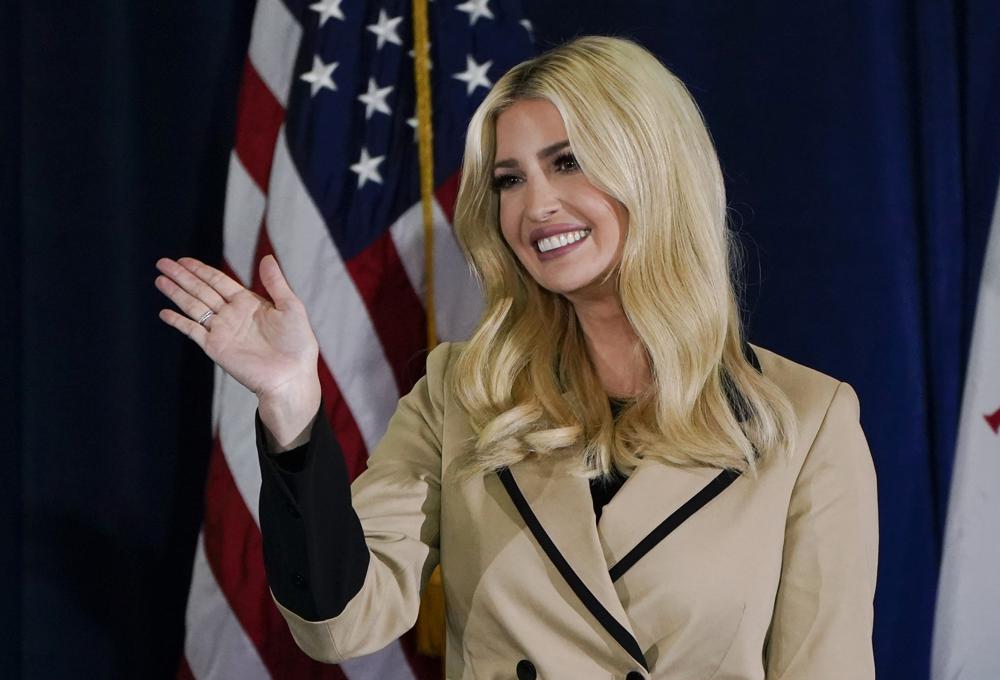
The House committee investigating the U.S. Capitol insurrection is asking Ivanka Trump, daughter of former President Donald Trump, to voluntarily cooperate as lawmakers make their first public attempt to arrange an interview with a Trump family member. The committee sent a letter Thursday requesting a meeting in February with Ivanka Trump, a White House adviser to her father. In the letter, the committee chairman, Rep. Bennie Thompson, D-Miss., said Ivanka Trump was in direct contact with her father during key moments on January 6, 2021, when Trump supporters stormed the Capitol in an effort to halt the congressional certification of Joe Biden’s presidential win. The riot followed a rally near the White House where Donald Trump had urged his supporters to “fight like hell” as Congress convened to certify the 2020 election results. The committee says it wants to discuss what Ivanka Trump knew about her father’s efforts, including a telephone call they say she witnessed, to pressure then-Vice President Mike Pence to reject those results, as well as concerns she may have heard from Pence’s staff, members of Congress and the White House counsel’s office about those efforts. “Ivanka Trump just learned that the January 6 Committee issued a public letter asking her to appear,” her spokesperson said. “As the Committee already knows, Ivanka did not speak at the January 6 rally.” The committee cited testimony that Ivanka Trump implored her father to quell the violence by his supporters, and investigators want to ask about her actions while the insurrection was underway. “Testimony obtained by the Committee indicates that members of the White House staff requested your assistance on multiple occasions to intervene in an attempt to persuade President Trump to address the ongoing lawlessness and violence on Capitol Hill,” Thompson wrote. The letter is the committee’s first attempt to seek information from inside the Trump family. Earlier this week, it issued subpoenas to lawyer Rudy Giuliani and other members of Trump’s legal team who filed meritless court challenges to the election that fueled the lie that the race had been stolen from Trump. The committee is narrowing in on three requests to Ivanka Trump, starting with a conversation alleged to have taken place between Donald Trump and Pence on the morning of the attack. The committee said Keith Kellogg, who was Pence’s national security adviser, was also in the room and testified to investigators that Trump questioned whether Pence had the courage to delay the congressional counting of the electoral votes. The Constitution makes clear that a vice president’s role is largely ceremonial in the certification process, and Pence had issued a statement before the congressional session that laid out his conclusion that a vice president could not claim “unilateral authority” to reject states’ electoral votes. “You were present in the Oval Office and observed at least one side of that telephone conversation,” the letter to Ivanka Trump said, adding that the committee “wishes to discuss the part of the conversation you observed” between the then-president and Pence. The letter also mentioned a message, in the days before the scheduled vote certification on January 6, 2021, between an unidentified member of the House Freedom Caucus to then-White House chief of staff Mark Meadows with an explicit warning: “If POTUS allows this to occur … we’re driving a stake in the heart of the federal republic.” POTUS is an abbreviation for President of the United States. The other requests in the letter to Ivanka Trump concern conversations after Donald Trump’s tweeted, “Mike Pence didn’t have the courage to do what should have been done to protect our Country and our Constitution.” The committee said White House staff and even members of Congress requested Ivanka Trump’s help in trying to convince her father that he should address the violence and tell rioters to go home. “We are particularly interested in this question: Why didn’t White House staff simply ask the President to walk to the briefing room and appear on live television — to ask the crowd to leave the capital?” Besides the subpoenas issued this week, the committee had a victory Wednesday when the Supreme Court rejected a bid by Trump to block the release of White House records sought by lawmakers. The National Archives began to turn over the hundreds of pages of records to the nine-member committee almost immediately. They include presidential diaries, visitor logs, speech drafts, and handwritten notes dealing with January 6 from the Meadows’ files. The committee’s investigation has touched nearly every corner of Trump’s orbit in the nearly seven months since it was created, from strategist Steve Bannon to media companies such as Twitter, Meta, and Reddit. The committee says it has interviewed nearly 400 people and issued dozens of subpoenas as it prepares a report set for release before the November elections. Still, the committee has run into roadblocks from some of Trump’s allies, including Bannon and Meadows, who have refused to fully cooperate. Their resistance has led the committee to file charges of contempt of Congress. The seven Democrats and two Republicans on the committee have also faced defiance from fellow lawmakers. House Minority Leader Kevin McCarthy, R-Calif., and GOP Reps. Scott Perry of Pennsylvania and Jim Jordan of Ohio have denied the committee’s requests for voluntary cooperation. While the committee has considered subpoenaing fellow lawmakers, that would be an extraordinary move and could run up against legal and political challenges. The committee says the extraordinary trove of material it has collected — 35,000 pages of records so far, including texts, emails, and phone records from people close to Trump — is fleshing out critical details of the worst attack on the Capitol in two centuries. The next phase of the investigation will include a series of public hearings in the coming months. Republished with the permission of the Associated Press.
January 6 committee prepares to go public as findings mount
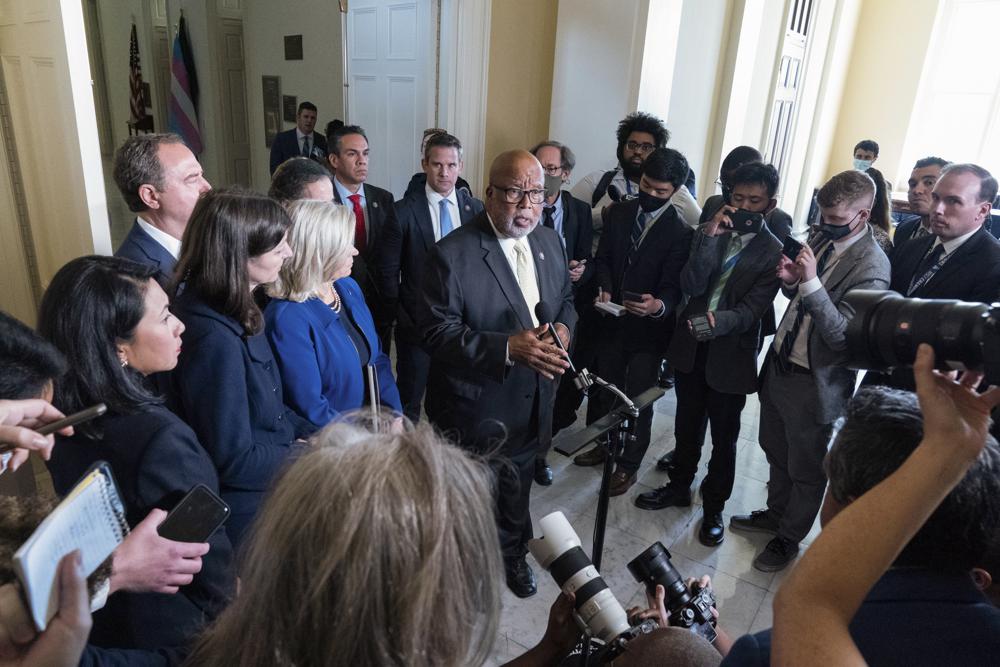
They’ve interviewed more than 300 witnesses, collected tens of thousands of documents, and traveled around the country to talk to election officials who were pressured by Donald Trump. Now, after six months of intense work, the House committee investigating the January 6 insurrection is preparing to go public. In the coming months, members of the panel will start to reveal their findings against the backdrop of the former president and his allies’ persistent efforts to whitewash the riots and reject suggestions that he helped instigate them. The committee also faces the burden of trying to persuade the American public that their conclusions are fact-based and credible. But the nine lawmakers — seven Democrats and two Republicans — are united in their commitment to tell the full story of January 6, and they are planning televised hearings and reports that will bring their findings out into the open. Their goal is not only to show the severity of the riot but also to make a clear connection between the attack and Trump’s brazen pressure on the states and Congress to overturn Joe Biden’s legitimate election as president. “The full picture is coming to light, despite President Trump’s ongoing efforts to hide the picture,” said Wyoming Rep. Liz Cheney, the committee’s vice chairwoman and one of its two Republican members. “I don’t think there’s any area of this broader history in which we aren’t learning new things,” she said. While the fundamental facts of January 6 are known, the committee says the extraordinary trove of material they have collected — 35,000 pages of records so far, including texts, emails, and phone records from people close to Trump — is fleshing out critical details of the worst attack on the Capitol in two centuries, which played out on live television. They hope to fill in the blanks about the preparations before the attack, the financing behind the January 6 rally that preceded it, and the extensive White House campaign to overturn the 2020 election. They are also investigating what Trump himself was doing as his supporters fought their way into the Capitol. True accountability may be fleeting. Congressional investigations are not criminal cases, and lawmakers cannot dole out punishments. Even as the committee works, Trump and his allies continue to push lies about election fraud while working to place similarly minded officials at all levels of state and local government. “I think that the challenge that we face is that the attacks on our democracy are continuing — they didn’t come to an end on January 6,” said another panel member, Rep. Adam Schiff, D-Calif., also chairman of the House Intelligence Committee. Still, the lawmakers hope they can present the public with a thorough accounting that captures what could have been “an even more serious and deeper constitutional crisis,” as Cheney put it. “I think this is one of the single most important congressional investigations in history,” Cheney said. The committee is up against the clock. Republicans could disband the investigation if they win the House majority in the November 2022 elections. The committee’s final report is expected before then, with a possible interim report coming in the spring or summer. In the hearings, which could start in the coming weeks, the committee wants to “bring the people who conducted the elections to Washington and tell their story,” said the panel’s chairman, Rep. Bennie Thompson, D-Miss. Their testimony, he said, will further debunk Trump’s claims of election fraud. The committee has interviewed several election officials in battleground states, including Arizona, Georgia, Michigan, and Pennsylvania, about Trump’s pressure campaign. In some cases, staff have traveled to those states to gather more information. The panel also is focusing on the preparations for the January 6 rally near the White House where Trump told his supporters to “fight like hell” — and how the rioters may have planned to block the electoral count if they had been able to get their hands on the electoral ballots. They need to amplify to the public, Thompson said, “that it was an organized effort to change the outcome of the election by bringing people to Washington … and ultimately if all else failed, weaponize the people who came by sending them to the Capitol.” About 90% of the witnesses called by the committee have cooperated, Thompson said, despite the defiance of high-profile Trump allies such as Steve Bannon and former White House chief of staff Mark Meadows. Lawmakers said they have been effective at gathering information from other sources in part because they share a unity of purpose rarely seen in a congressional investigation. House Republican leader Kevin McCarthy of California, a close Trump ally, decided not to appoint any GOP members to the committee after House Speaker Nancy Pelosi, D-Calif., rejected two of his picks last summer. Pelosi, who created the select committee after Republican senators rejected an evenly bipartisan outside commission, subsequently appointed Republicans Cheney and Adam Kinzinger of Illinois, Trump critics who shared the Democrats’ desire to investigate the attack. “I think you can see that Kevin made an epic mistake,” Kinzinger said. “I think part of the reason we’ve gone so fast and have been so effective so far is because we’ve decided, and we have the ability to do this as a nonpartisan investigation.” Kinzinger said the investigation would be “a very different scene” if Republicans allied with Trump were participating and able to obstruct some of their work. “I think in five or ten years, when school kids learn about January 6, they’re going to get the accurate story,” Kinzinger said. “And I think that’s going to be dependent on what we do here.” Democrats say having two Republicans working with them has been an asset, especially as they try to reach conservative audiences who may still believe Trump’s falsehoods about a stolen election. “They bring to the table perspectives and ability to translate a little bit what is being reflected in conservative media, or how this might be viewed through a
Donald Trump endorses Paul Gosar one day after House censure
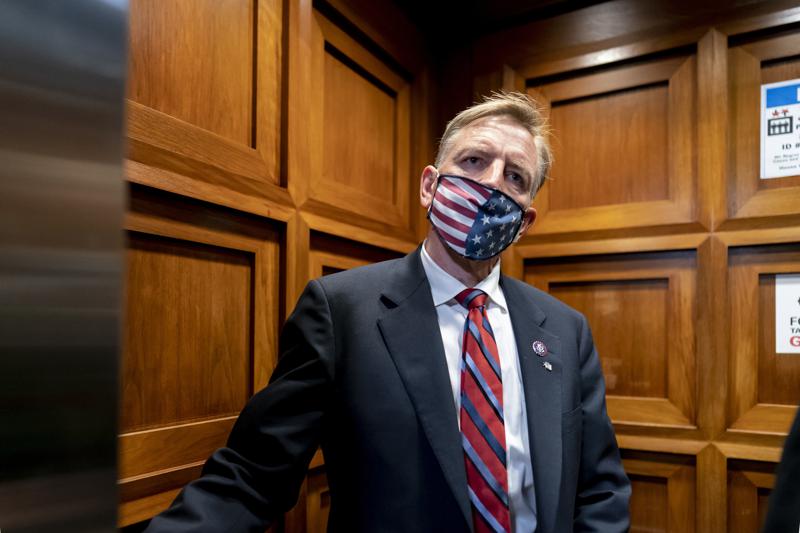
Former President Donald Trump is endorsing Rep. Paul Gosar one day after the Arizona Republican was censured by the House of Representatives for posting a violent cartoon video that depicted a character with his face killing one with New York Rep. Alexandria Ocasio-Cortez’s. Trump, in a statement, hailed Gosar as “a loyal supporter of our America First agenda” and “highly respected in Arizona,” and said he “has my Complete and Total Endorsement!” The statement made no mention of the House’s rare rebuke — just the fourth in nearly 40 years — which also stripped Gosar of his two committee assignments on the Natural Resources and the Oversight and Reform panels. Gosar has said the video, which was produced by his taxpayer-funded office, had been mischaracterized and was not intended to be a threat. In addition to Ocasio-Cortez, the video also depicted Gosar’s character attacking President Joe Biden with swords. Gosar is no stranger to controversy. He’s made appearances at fringe right-wing events, including a gathering in Florida last February hosted by a man who has promoted white supremacist beliefs, and earlier this year looked to form an America First Caucus with other hard-line Republican House members that aimed to promote “Anglo-Saxon political traditions.” Republican Minority Leader Kevin McCarthy, meanwhile, has called the censure an “abuse of power” by Democrats and signaled payback should Republicans retake the House majority next year. Republished with the permission of the Associated Press.
Barry Moore cosigns letter to boot Liz Cheney and Adam Kinzinger out of GOP conference
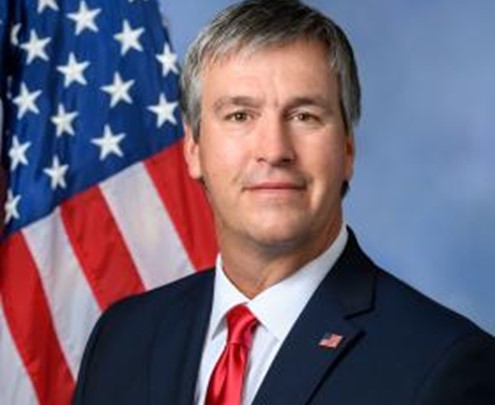
Congressman Barry Moore signed a letter to Minority Leader Kevin McCarthy requesting a reconsideration of a GOP Conference Rule change that would remove members who accept committee assignments or serve on a committee without a recommendation from the Republican Steering Committee or the Republican Leader. The letter, written by Arizona Rep. Andy Biggs, comes in response to the select committee investigating the January 6th attack on the Capitol. McCarthy was given five picks to serve on the committee. However Nancy Pelosi rejected two, and McCarthy pulled his other three as well. Pelosi, in an effort to maintain a bipartisan committee, asked Liz Cheney and Adam Kinzinger to serve on the committee, and they accepted. Congressman Moore stated, “It is absurd that a formal rule prohibiting this behavior is necessary, but Republicans must be united to defeat Nancy Pelosi’s socialist takeover of America, and the Republican conference should swiftly make this rule change to expel anyone who has chosen to take marching orders from her.” “Accepting committee assignments from Speaker Pelosi and ignoring the long-standing practice and rule of being nominated by designated GOP members is a betrayal to our party’s efforts against Pelosi and the Far Left’s attacks,” stated Biggs. “As Republican Members of Congress, it is our duty to strategize effective measures that protect America’s foundational values. We cannot allow our party, which stands as a bulwark against the socialist agenda of the Democrats, to be infiltrated by individuals who are coordinating with members of the opposition. Our party’s integrity, and the voice of conservative Americans who voted for us, must be protected and upheld.” Removal from the conference requires a two-thirds vote of all its members. Only the party leader can bring such a motion to a vote. Kinzinger’s spokesperson Maura Gillespie said in a statement that the congressman is looking for answers about the January 6 attack. “When a Member makes repeated calls to remove Representatives Kinzinger and Cheney from the Conference, it certainly calls into question their true motives,” Gillespie said. “Especially when that Member pushes conspiracy theories to their constituents and outright lies for their own personal gain.” The letter to McCarthy states, “Congresswoman Cheney and Congressman Kinzinger are two spies for the Democrats that we currently invite to the meetings, despite our inability to trust them.” On Twitter, Kinzinger responded, “I think this is interesting. Just coming off a member declaring bloodshed will happen, many pushing Covid denialism and Jan 6 trutherism….The GOP has a choice. I am even more committed to getting the truth now.” In July, Cheney posted on Twitter, “We cannot leave the violence of January 6th – and its causes – uninvestigated. We must know what happened at the Capitol and the White House on the day.” Matt Gaetz, one of the 16 cosigners commented, “Instead of investigating the Jihad Squad’s connections to groups that foment political violence like BLM and Antifa, Liz Cheney and Adam Kinzinger have taken on Pelosi appointments to target the Republican Firebrands in Congress. Kevin McCarthy should remove them from their committees immediately.” Rep. Marjorie Taylor Greene stated, “Liz Cheney and Adam Kinzinger knew all along the Jan. 6 committee was Witch Hunt 2.0, just like the one Democrats launched against President Trump. They’ve sold out Republicans and they must be thrown out of the GOP conference!” Additional cosigners of the letter are Reps. Jody Hice, Matt Gaetz, Andrew Clyde, Marjorie Taylor Greene, Lauren Boebert, Dan Bishop, Randy Weber, Ralph Norman, Andy Harris, Scott Perry, Bill Posey, Madison Cawthorn, Mary Miller, Louie Gohmert, and Bob Good.
House panel probing 1/6 riot seeks host of Trump-era records
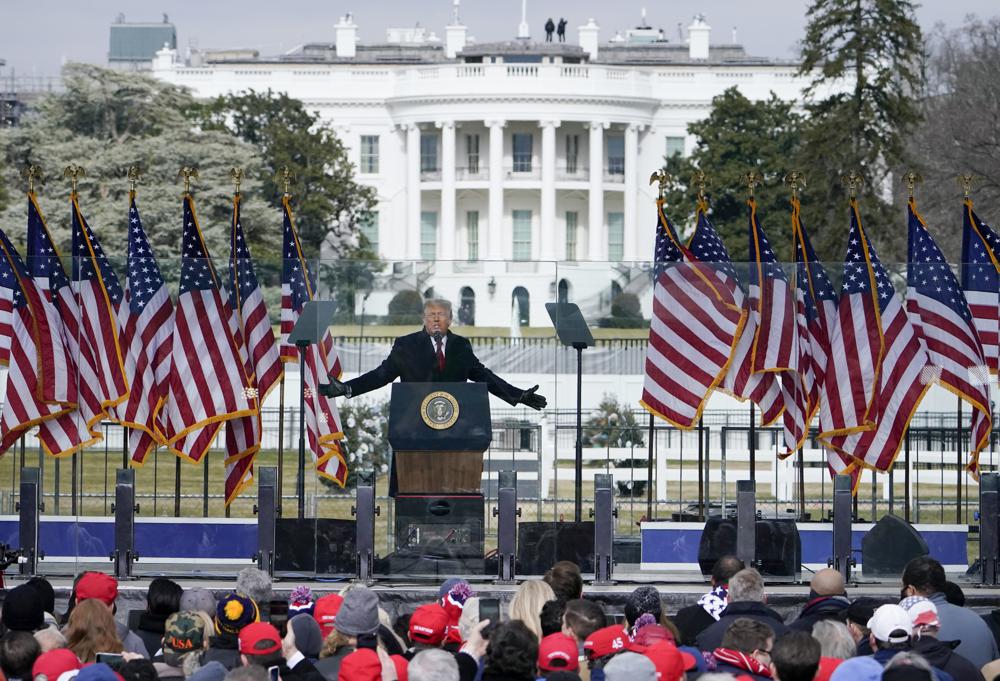
The House committee investigating the January insurrection at the U.S. Capitol is demanding a trove of records from federal intelligence and law enforcement agencies, showing the sweep of the lawmakers’ review of the deadly attack by a mob of Donald Trump supporters. The request Wednesday seeks information about events leading up to the Jan. 6 riot, including communication within the White House under then-President Trump and other agencies, and information about planning and funding for rallies held in Washington. Among them is an event at the Ellipse, near the White House, featuring remarks by Trump where he egged on a crowd of thousands before loyalists stormed the Capitol. The requested documents are just the beginning of what is expected to be a lengthy partisan and rancorous investigation into how the mob was able to infiltrate the Capitol and disrupt the certification of Democrat Joe Biden’s presidential victory, inflicting the most serious assault on Congress in two centuries. Committee members are also considering asking telecommunications companies to preserve phone records of several people, including members of Congress, to try to determine who knew what about the unfolding riot and when they knew it. With chants of “hang Mike Pence,” the rioters sent the then-vice president and members of Congress running for their lives and did more than $1 million in damage, and wounded dozens of police officers. Records requests are typically the starting point for investigations, and the committee is expected to conduct a wide-ranging review as it builds a public record detailing the chaos on Jan. 6. That inquiry could take more than a year, until the end of the congressional session. The demands are being made for White House records from the National Archives, along with material from the departments of Defense, Justice, Homeland Security and Interior, as well as the FBI and the Office of the Director of National Intelligence. The committee is also seeking information about efforts within the Trump administration to push the president’s baseless claims of election fraud and any efforts to try to overturn the results of November’s election or to “impede the peaceful transfer of power.” The request for the National Archives and Records Administration is 10 pages long. The committee is seeking “All documents and communications within the White House on January 6, 2021” related to Trump’s close advisers and family members, the rally at the Ellipse, and Trump’s Twitter feed. It asks for his specific movements on that day and communications, if any, from the White House Situation Room. Also sought are all documents related to the claims of election fraud, as well as Supreme Court decisions on the topic. Rep. Bennie Thompson, D-Miss., is heading the committee, appointed by House Speaker Nancy Pelosi, D-Calif., after all, but two Republicans opposed the creation of the 13-person panel. The committee so far has heard from police officers who were at the Capitol on Jan. 6. In emotional testimony, those officers spoke of how afraid and frustrated they were by the failure of law enforcement leaders to foresee the potential for violence and understand the scope of planning by the Trump backers. A Capitol Police officer who fatally shot protester Ashli Babbitt was cleared months ago of criminal wrongdoing and was cleared internally by the department this week, and was planning to reveal his identity in an NBC interview to air Thursday. Most in the GOP argued that the majority-Democratic committee would conduct a partisan inquiry. House Democrats originally attempted to create an evenly split, independent commission to investigate the insurrection, but that effort fell short when it was blocked by Senate Republicans. Thompson did not identify the lawmakers whose records the committee would seek, but he has said officials would be contacting communication companies, social media platforms, and other tech giants. House Republican leader Kevin McCarthy of California, who had been in touch with Trump from the besieged Capitol on Jan. 6, again dismissed the committee’s investigation as “so political.” When he was asked whether he would turn over his own phone logs from Jan. 6, he said Wednesday, “I told the American public who I talked to that day,” referring to his television news appearances that day. In a Fox News appearance Tuesday evening, Rep. Jim Banks, R-Ind., whose phone records may also be sought, said it was “an abuse of power” to investigate lawmakers. Thompson, in a written statement, said the committee’s work was rooted in apolitical fact-finding. “Our Constitution provides for a peaceful transfer of power, and this investigation seeks to evaluate threats to that process, identify lessons learned and recommend laws, policies, procedures, rules, or regulations necessary to protect our republic in the future,” he said. Republished with the permission of the Associated Press.
House passes bill bolstering landmark voting law
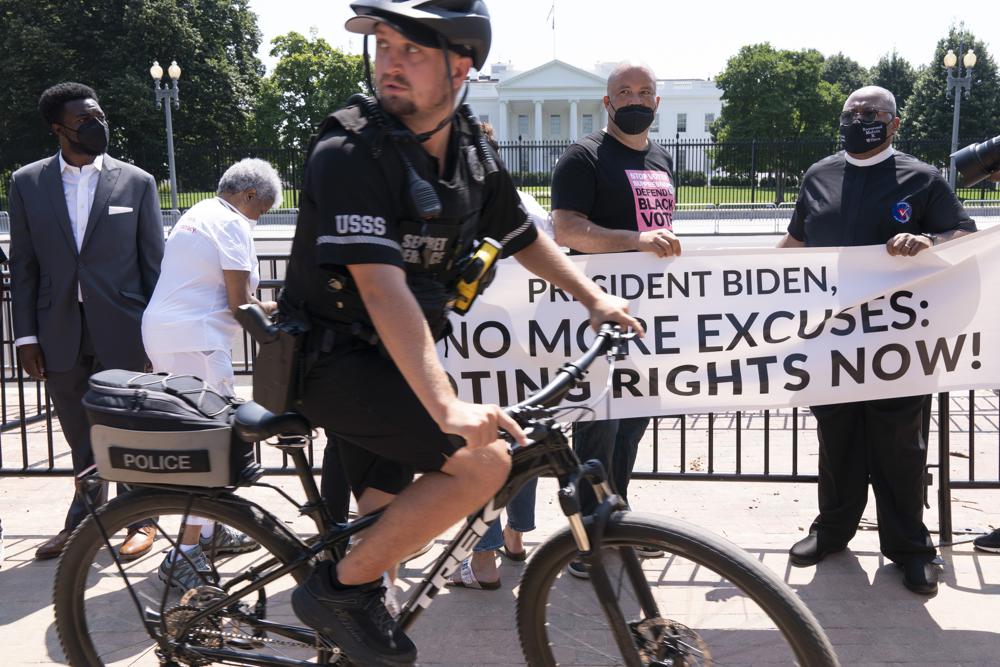
House Democrats have passed legislation that would strengthen a landmark civil rights-era voting law weakened by the Supreme Court over the past decade, a step party leaders tout as progress in their quest to fight back against voting restrictions advanced in Republican-led states. The bill, which is part of a broader Democratic effort to enact a sweeping overhaul of elections, was approved on a 219-212 vote, with no Republican support. Its Tuesday passage was praised by President Joe Biden, who said it would protect a “sacred right” and called on the Senate to “send this important bill to my desk.” But the measure faces dim prospects in that chamber, where Democrats do not have enough votes to overcome opposition from Senate Republicans, who have rejected the bill as “unnecessary” and a Democratic “power grab.” That bottleneck puts Democrats right back where they started with a slim chance of enacting any voting legislation before the 2022 midterm elections when some in the party fear new GOP laws will make it harder for many Americans to vote. But they still intend to try. Speaking from the House floor, Speaker Nancy Pelosi said it was imperative for Congress to counteract the Republican efforts, which she characterized as “dangerous” and “anti-democratic.” “Democracy is under attack from what is the worst voter suppression campaign in America since Jim Crow,” Pelosi said. The John Lewis Voting Rights Advancement Act, named for the late Georgia congressman who made the issue a defining one of his career, would restore voting rights protections that have been dismantled by the Supreme Court. Under the proposal, the Justice Department would again police new changes to voting laws in states that have racked up a series of “violations,” drawing them into a mandatory review process known as “preclearance.” The practice was first put in place under the Voting Rights Act of 1965. But it was struck down by a conservative majority on the Supreme Court in 2013, which ruled the formula for determining which states needed their laws reviewed was outdated and unfairly punitive. The court did, however, say that Congress could come up with a new formula, which is what the bill does. A second ruling from the court in July made it more difficult to challenge voting restrictions in court under another section of the law. The bill’s sponsor, Rep. Terri Sewell, said “old battles have indeed become new again,” enabled by the Supreme Court’s rulings. “While literacy tests and poll taxes no longer exist, certain states and local jurisdictions have passed laws that are modern-day barriers to voting,” said Sewell, an Alabama Democrat. In many cases, the new bill wouldn’t apply to laws enacted in the years since the court’s 2013 ruling. That likely includes the wave of new Republican-backed restrictions inspired by Donald Trump’s false claims of a stolen 2020 election. But if signed into law along with Democrats’ other election bill, the For the People Act, many of those restrictions could be neutralized — and likely prevented from getting approved again. Both laws would likely face legal challenges. In the short term, the vote Tuesday was expected to soothe restive Democratic activists who have been frustrated by inaction on the issue in the Senate. NAACP President Derrick Johnson said he was “encouraged” by the bill’s passage. But he also offered a thinly veiled threat, pledging to watch closely as the Senate takes it up and “keep track of every yea and every nay” vote. “Make no mistake, we will be there, on the ground in 2022, in every state that needs a new Senator,” he said in a statement. Democrats’ slim 50-50 majority in the Senate means they lack the 60 votes needed to overcome a filibuster. For months, progressives have called for scrapping the filibuster, but a number of moderate Democrats oppose the idea, denying the votes needed to do so. It’s also not clear that the John Lewis Voting Rights Advancement Act, as written, would be supported by all Democrats in the Senate, where there are no votes to spare. One provision in the bill would ban many types of voter ID laws, including those already on the books. That’s at odds with a proposal from West Virginia Sen. Joe Manchin, who is the chamber’s most conservative Democrat. He’s spent weeks working with Senate leadership to develop a more narrowly focused alternative to the For the People Act and has specifically called for a voter ID standard that would allow for people to use a document like a utility bill. Republicans, meanwhile, blasted the timing of the measure, noting that Pelosi called Democrats back from August recess to pass the bill, as well as to take votes on Democrats’ spending priorities when the U.S. is dealing with its chaotic withdrawal from Afghanistan. “If there’s any moment in time to put an election aside, if there’s any moment of time to put politics aside, I would have thought today was this day,” said House Minority Leader Kevin McCarthy. Conservatives also criticized the bill as a departure from the 1965 voting law, which used minority turnout data as well as a place’s history of enacting discriminatory voting laws when determining which places would be subject to preclearance. The new bill, instead, leans heavily on looser standards, such as using the number of legal settlements and consent decrees issued in voting rights cases to pull places into preclearance. That would, Republicans argue, play into the hands of Democrats, who have built a sophisticated and well-funded legal effort to challenge voting rules in conservative-leaning states. Rep. Michelle Fischbach, a Minnesota Republican, predicted it would be a boon for Democratic advocacy groups and trial lawyers, who would “file as many objections as possible to manufacture litigation.” “It empowers the attorney general to bully states and seek federal approval before making changes to their own voting laws,” she said. Republished with the permission of the Associated Press.
Alabama congressional delegation responds to first day of testimony in January 6th hearing
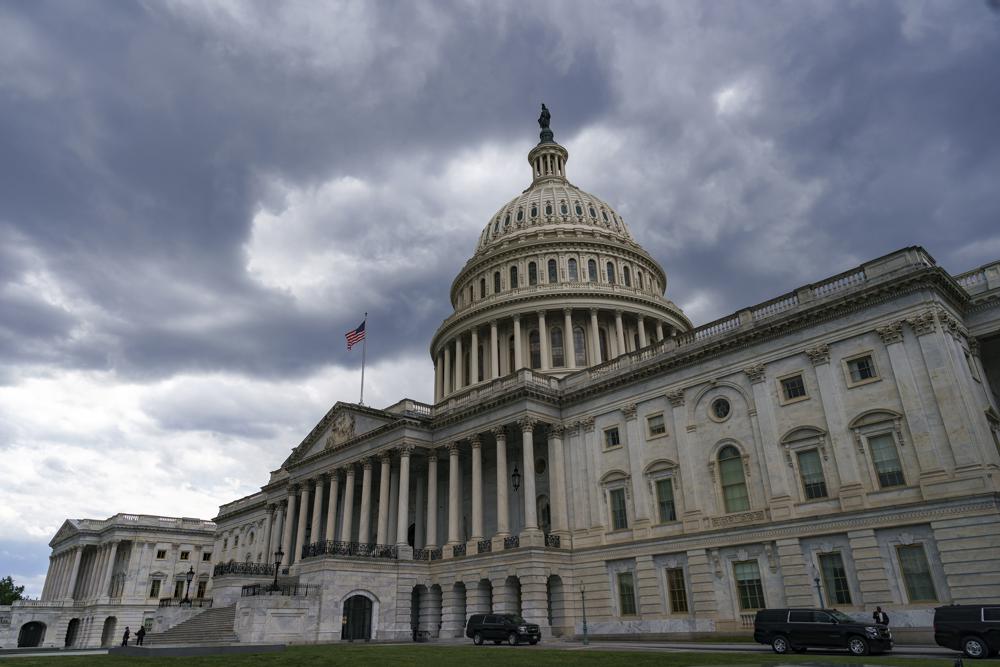
In early July, the U.S. House of Representatives approved legislation to create a committee to investigate the January 6 attack on the U.S. Capitol. House Resolution 503 passed the House, with most Democrats voting for the resolution and most Republicans voting against it. The committee was approved by a 222-190 vote. In Alabama, Republicans Jerry Carl, Barry Moore, Mike Rogers, Robert Aderholt, Mo Brooks, and Gary Palmer all voted against the resolution. Democrat Terri Sewell voted yes. This is the first hearing to investigate the attack by pro-Trump rioters who attempted to stop the certification of the presidential election, which Donald Trump lost to Democrat Joe Biden. As hearings began today for the January 6th investigation, four police officers testified about what they experienced during the riot. According to NPR, Lawmakers on the panel praised the officers’ heroism and criticized leaders who have denied the events of that day. Congressman Jerry Carl released a statement, saying, “As Nancy Pelosi continues wasting time and resources pursuing her partisan investigation into January 6th, I support Leader [Kevin] McCarthy’s decision to boycott this sham process until Pelosi seats all five Republican nominees. Pelosi’s decision to deny the input of members who have served our country in the military and in law enforcement is flat-out wrong and is a complete abuse of power. This is the exact reason why I voted against creating the Select Committee on January 6 – Congress should not waste taxpayer dollars on a partisan witch hunt that will serve no purpose other than demonizing an entire political party and weaponizing the events of January 6.” Terri Sewell tweeted, “I remember #January6th like it was yesterday. I was in the gallery of the House chamber when the breach occurred. I remember lying on the floor huddling with other Members, struggling to fit on a gas mask & hearing a thunderous sound. I trembled and wept for our democracy.” Rep. Barry Moore stated on Twitter, “From soaring inflation to rising crime, Americans are facing real issues across our nation due to Democrats’ failed policies. But instead of finding solutions to these crises, the House is focused on Pelosi’s sham investigation. The American people deserve better.”
Hearing exposes TV viewers to blunt language, racial slurs
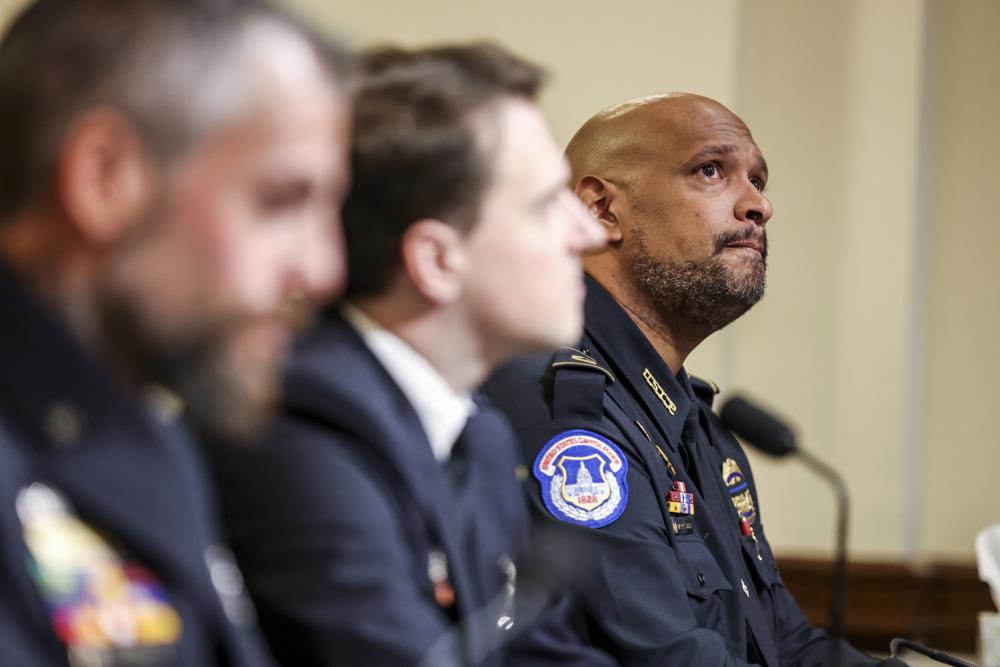
People who watched the first day of a House investigation into the Jan. 6 uprising at the U.S. Capitol on Tuesday were exposed to the sort of blunt language, including profanity and racial slurs, rarely heard on daytime television. The hearing featured emotional testimony from four police officers who defended the Capitol and video clips of violence and mayhem. It was shown live widely, but not uniformly, on several television networks. Capitol Police Officer Harry Dunn, who is Black, said one rioter cursed him and called him the n-word, a phrase that was repeated and even chanted at him. Dunn didn’t mask any language while describing it. Networks warned of graphic material in onscreen messages. In initial accounts of Dunn’s testimony, The Washington Post, The New York Times, and The Associated Press all mentioned the slur but did not spell it out. CNN’s website linked to a video with the headline, “Capitol police officer recounts rioters calling him the n-word.” The video itself, after warning of graphic language, used Dunn’s full quotes. Cable networks CNN, Fox News Channel, and MSNBC carried the hearing, lasting more than three hours, in full. ABC pre-empted daytime programming to air most of it but not CBS and NBC. Instead of compelling their local stations to carry it, those networks said it was optional. It wasn’t immediately clear how many CBS and NBC stations chose to air it, but those in the New York and Los Angeles markets did not. Television executives argue that consumers have many more options to see such events than they did years ago, including live streaming. “The fact is, people don’t go to broadcast television for live, breaking news the way they used to,” said Mark Lukasiewicz, who ran NBC News’ special events unit until 2017 and is now dean of the School of Communication at Hofstra University. Still, there’s no better way to catch a casual viewer’s attention and signal an event’s importance than broadcast television special reports. Some Republicans, like House Minority Leader Kevin McCarthy, have minimized the investigation as being partisan. So it was noteworthy that Fox News Channel, the favored destination for many Republican viewers, aired Tuesday’s testimony. While onscreen chyrons occasionally reminded viewers that the investigatory committee was “Pelosi-selected” and “Dem-led,” the network stuck with the hearing through the question-and-answer period until the end. Fox’s Bret Baier said the hearing was an “eye-opener” for anyone who considered Jan. 6 a non-violent protest. “You cannot watch this testimony and say that it’s not a big deal,” he said. Republished with the permission of the Associated Press.
Kevin McCarthy proposes 5 Republicans to sit on Jan. 6 panel
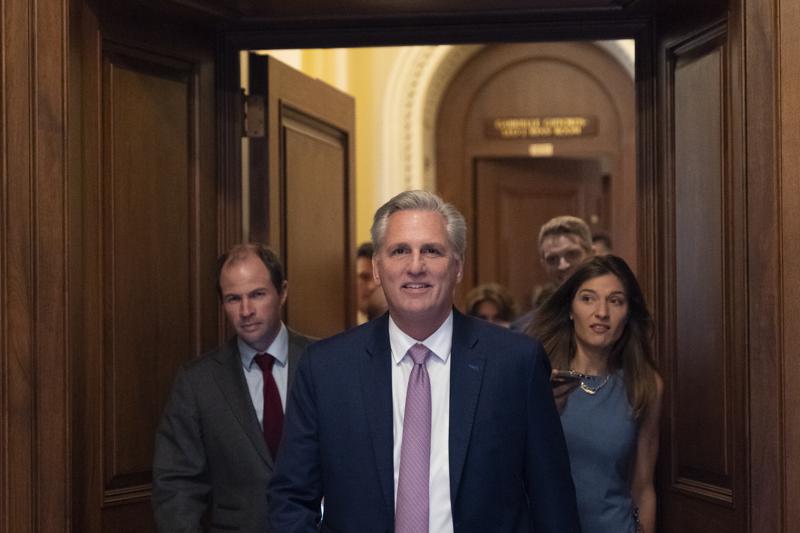
House Republican leader Kevin McCarthy has picked five Republicans to sit on the new select committee to investigate the Jan. 6 insurrection at the Capitol, signaling that Republicans will participate in the investigation that they have staunchly opposed. McCarthy said Monday that he had selected Indiana Rep. Jim Banks, who recently visited former President Donald Trump on trips to the U.S.-Mexico border and Trump’s New Jersey golf club, to be the top Republican on the panel. The Republican leader also tapped Ohio Rep. Jim Jordan, Illinois Rep. Rodney Davis, North Dakota Rep. Kelly Armstrong, and Texas Rep. Troy Nehls to serve on the committee. House Speaker Nancy Pelosi must approve the names before they are final, per committee rules. An aide to Pelosi said she had received notification from McCarthy, but it is unclear when or if she will approve the GOP members. The aide was granted anonymity to discuss the Republican picks ahead of an official announcement. The five Republican men selected by McCarthy have all backed Trump, whose supporters laid siege to the Capitol building on Jan. 6 and interrupted the certification of President Joe Biden’s victory. Banks, Jordan, and Nehls all voted to overturn Biden’s win that day, even after the rioting. Davis and Armstrong were among the minority of Republicans who voted to certify Biden’s win. McCarthy’s picks come after all, but two Republicans opposed the creation of the 13-person select committee in a House vote last month, with most in the GOP arguing that the majority-Democratic panel would conduct a partisan probe. House Democrats originally attempted to create an evenly split, independent commission to investigate the insurrection, but that effort fell short when it was blocked by Senate Republicans. House Republicans have largely remained loyal to Trump despite the violent insurrection of his supporters that sent many of them running for their lives. Banks made clear in a statement Monday evening that he would take a politically combative approach to his leadership on the panel, sharply criticizing the Democrats who had set it up. “Make no mistake, Nancy Pelosi created this committee solely to malign conservatives and to justify the Left’s authoritarian agenda,” Banks said. Jordan, one of Trump’s staunchest defenders through his two impeachments and the top Republican on the House Judiciary Committee, said after the House vote to form the panel that he believed the investigation is “impeachment three” against the former president. Trump was impeached by the House and acquitted by the Senate both times. The members selected by McCarthy had mixed reactions to the insurrection as it happened on Jan. 6. While Jordan led the effort to overturn election results, others tweeted to the rioters to end the violence or condemned it. “Thank you to the Capitol police and all law enforcement,” Armstrong tweeted shortly after the House was evacuated that afternoon. “Rioting is not protesting. This needs to stop. Now.” Around the same time, Davis tweeted: “This is a sad day for our country. The lawlessness has got to stop. Protestors must leave the Capitol so Congress can resume the process of confirming the Electoral College vote.” Nehls, a former sheriff, was one of several members who helped barricade the House doors as rioters tried to beat them down. He tweeted an Associated Press photo of himself holding the door alongside Capitol Police — face to face with rioters who had broken the glass in the entryway. “I was proud to stand shoulder to shoulder with Capitol police barricading entrance to our sacred House chamber while trying to calm the situation talking to protestors,” Nehls tweeted. “What I’m witnessing is a disgrace. We’re better than this. Violence is NEVER the answer. Law and order!” A week later, all five members voted against the impeachment of Trump, who had told his supporters gathered in Washington on Jan. 6 to “fight like hell” to overturn his election defeat. The Democratic chair of the select committee, Mississippi Rep. Bennie Thompson, said Monday evening that he hadn’t seen the GOP names but referred the matter to Pelosi. “It’s up to her,” he said. Pelosi named eight members of the committee earlier this month — seven Democrats and Republican Rep. Liz Cheney of Wyoming, who has strongly criticized Trump and has been the most outspoken member of her caucus against the insurrection. Cheney, who was demoted from GOP leadership in May over her comments, was one of the two Republicans who voted in favor of forming the committee, along with Illinois Rep. Adam Kinzinger. As McCarthy stayed quiet for weeks on Republican participation on the panel, Thompson has said that the committee will have a quorum to conduct business whether GOP members are present or not. The new members will be put to the test at the panel’s first hearing next week, with at least four rank-and-file police officers who battled rioters that day testifying about their experiences. Dozens of police officers were injured as the crowd pushed past them and broke into the Capitol building. Seven people died during and after the rioting, including a woman who was shot by police as she tried to break into the House chamber and three other Trump supporters who suffered medical emergencies. Two police officers died by suicide in the days that followed, and a third officer, Capitol Police Officer Brian Sicknick, collapsed and later died after engaging with the protesters. A medical examiner determined he died of natural causes. Republished with the permission of the Associated Press.
Pfizer to discuss vaccine booster with U.S. officials Monday
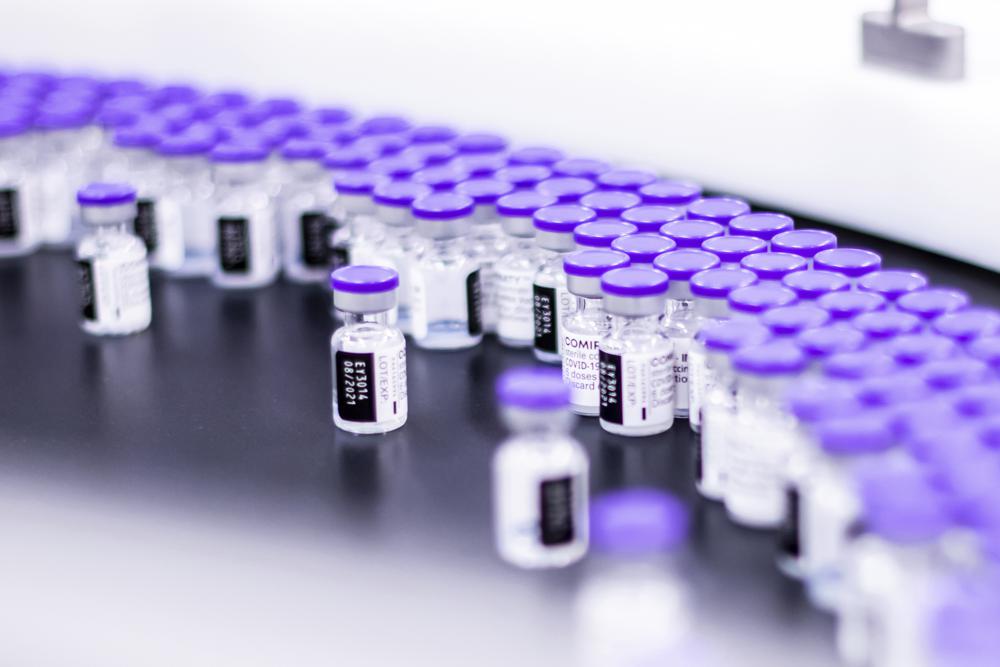
Pfizer says it plans to meet with top U.S. health officials Monday to discuss the drugmaker’s request for federal authorization of a third dose of its COVID-19 vaccine as President Joe Biden’s chief medical adviser acknowledged that “it is entirely conceivable, maybe likely” that booster shots will be needed. The company said it was scheduled to have the meeting with the Food and Drug Administration and other officials Monday, days after Pfizer asserted that booster shots would be needed within 12 months. Pfizer’s Dr. Mikael Dolsten told The Associated Press last week that early data from the company’s booster study suggests people’s antibody levels jump five- to 10-fold after a third dose, compared to their second dose months earlier — evidence it believes supports the need for a booster. On Sunday, Dr. Anthony Fauci didn’t rule out the possibility but said it was too soon for the government to recommend another shot. He said the Centers for Disease Control and Prevention and the FDA did the right thing last week by pushing back against Pfizer’s assertion with their statement that they did not view booster shots as necessary “at this time.” Fauci said clinical studies and laboratory data have yet to fully bear out the need for a booster to the current two-shot Pfizer and Moderna vaccines or the one-shot Johnson & Johnson regimen. “Right now, given the data and the information we have, we do not need to give people a third shot,” he said. “That doesn’t mean we stop there. … There are studies being done now ongoing as we speak about looking at the feasibility about if and when we should be boosting people.” He said it was quite possible in the coming months “as data evolves” that the government may urge a booster based on such factors as age and underlying medical conditions. “Certainly it is entirely conceivable, maybe likely at some time, we will need a boost,″ Fauci said. Monday’s planned meeting between Pfizer and U.S. health officials was first reported by The Washington Post. Currently, only about 48% of the U.S. population is fully vaccinated. Some parts of the country have far lower immunization rates, and in those places, the delta variant is surging. Last week, Dr. Rochelle Walensky, the CDC director, said that’s leading to “two truths” — highly immunized swaths of America are getting back to normal while hospitalizations are rising in other places. Fauci said it was inexplicable that some Americans are so resistant to getting a vaccine when scientific data show how effective it is in staving off COVID-19 infections and hospitalizations, and he was dismayed by efforts to block making vaccinations more accessible, such as Biden’s suggestion of door-to-door outreach. Gov. Asa Hutchinson, R-Ark., agreed Sunday that there is vaccine resistance in Southern and rural states like his because “you have that more conservative approach, skepticism about government.” Describing his efforts to boost vaccinations in his state, which is seeing rising infections, Hutchinson said, “no one wants an agent knocking on a door,” but “we do want those that do not have access otherwise to make sure they know about it.” The grassroots component of the federal vaccination campaign has been in operation since April when supplies of shots began outpacing demand. It was outlined and funded by Congress in the $1.9 trillion COVID-19 relief bill passed in March and overwhelmingly is carried out by local officials and private-sector workers, and volunteers. Rep. Adam Kinzinger, R-Ill., blasted opposition to vaccination efforts from some GOP lawmakers as “absolute insanity.” He said House Republican leader Kevin McCarthy of California and others in the party need to speak out against “these absolute clown politicians playing on your vaccine fears for their own selfish gain.” Fauci appeared on CNN’s “State of the Union,” ABC’s “This Week,” and CBS’ “Face the Nation”; Hutchinson spoke on ABC, and Kinzinger was on CNN. Republished with the permission of the Associated Press.


